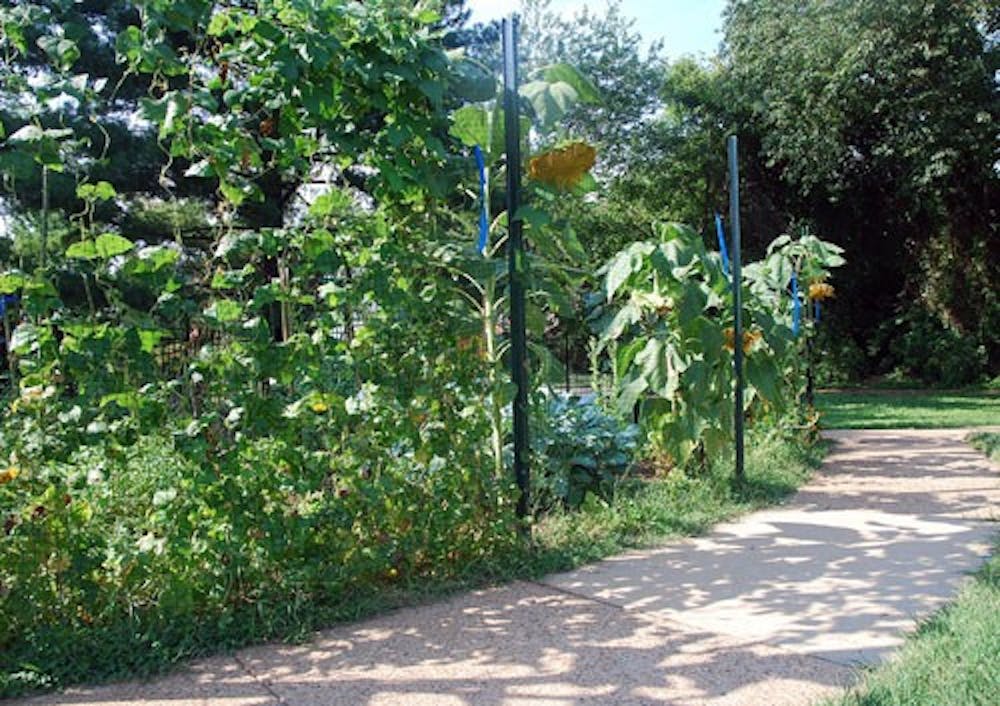The EcoSense community garden has flourished since its ground-breaking on Campus Beautification Day last May, according to EcoSense President Drew Veysey.
The garden was created last May and has been cared for by members of the entire AU community. Tomatoes, eggplants, basil, parsley, carrots, banana peppers, pumpkins and sunflowers are all growing in the plot behind Nebraska Hall, according to Kate Pinkerton, a senior in the College of Arts and Sciences and the EcoSense garden representative.
However, one crop that did die over the summer months was broccoli, she said.
"The broccoli was lost to bugs," Pinkerton said. "In the future, we're looking at environmentally-friendly ways of protecting the plants."
One natural pesticide already implemented in the garden is a border of marigolds, which Dave Wilson, grounds supervisor of facilities, told EcoSense would help to ward-off insects, according to Pinkerton.
Another way the EcoSense garden is pursuing environmentally-friendly practices is by fertilizing with a natural compost, which is a combination of rotted vegetables, weeds and food waste, according to Pinkerton.
"Food waste is an unnecessary thing to throw away," she said. "So composting is another sustainable initiative of this garden."
The garden itself is part of a broader effort of EcoSense to demonstrate the concept of urban gardening and sustainable, environmental agriculture to the AU community, according to Julie Munro, former president and current member of EcoSense.
"Ultimately, we'd like to be an educational tool for the campus community as well as for the surrounding ... community," said Munro, a junior in CAS. "We're trying to show people how easy it is to grow food in a city."
Veysey, a junior in CAS and the School of Public Affairs, said there are health and environmental implications of locally grown foods.
"By eating food closer to home, you have less of an environmental impact," he said. "Also, this is fertilizer- and pesticide-free. That's more healthy for people."
Wilson said he simply likes the taste of fresh vegetables.
"When they're ripe I can pick them off the vine and eat them right there," he said.
Althea Mickiewicz, a senior in CAS who is currently studying abroad in China, was part of the original initiative to reach out to the community through education, according to Pinkerton.
"[Mickiewicz] got an Eagle Endowment grant ... for environmental education in schools in D.C.," Pinkerton said. "[She] traveled to schools to teach them about gardening and the environment."
EcoSense also donated some of the vegetables to Bread for the City, a Food Bank in Northeast D.C., Pinkerton said.
"This garden has brought together so many people at AU and other community members," she said.
Faculty, students and staff from AU have been very involved with maintaining the garden, especially over the summer, according to EcoSense Community Service Director and CAS junior, Anjali Bean.
"There is a small, dedicated [volunteer] team of faculty and students who are watering," Pinkerton said. "It was pretty well-organized [by Mickiewicz] in the summer, I would say."
Facilities Management, in particular, was instrumental in carrying out this project and lending tools, according to Pinkerton.
"They're the ones who donated the poles and deer fence that we set up," she said. "On Campus Beautification Day, we had ... five staff working to wheelbarrow compost onto the garden, and they provided a tiller [with which] we tilled the garden twice."
Wilson, who has worked in the gardening and landscaping industry for 35 years, used his background knowledge and expertise to help EcoSense with the garden, he said.
"I do my own garden at home, and as I grew up I did a garden with my parents," he said. "I knew what to do, and I showed [EcoSense] how ... to stake up tomatoes, monitor the cucumbers and build the deer fence."
Since the idea for the garden originated last fall and culminated at the ground breaking on Campus Beautification Day, it has required a lot of work, according to Veysey.
"It hasn't been tremendous in cost -- it's just taken time," Veysey said.
There are still many plans in store for the EcoSense garden, such as harvesting parties and possibly a pumpkin carving, Pinkerton said.
You can reach this staff writer at mfowler@theeagleonline.com.





